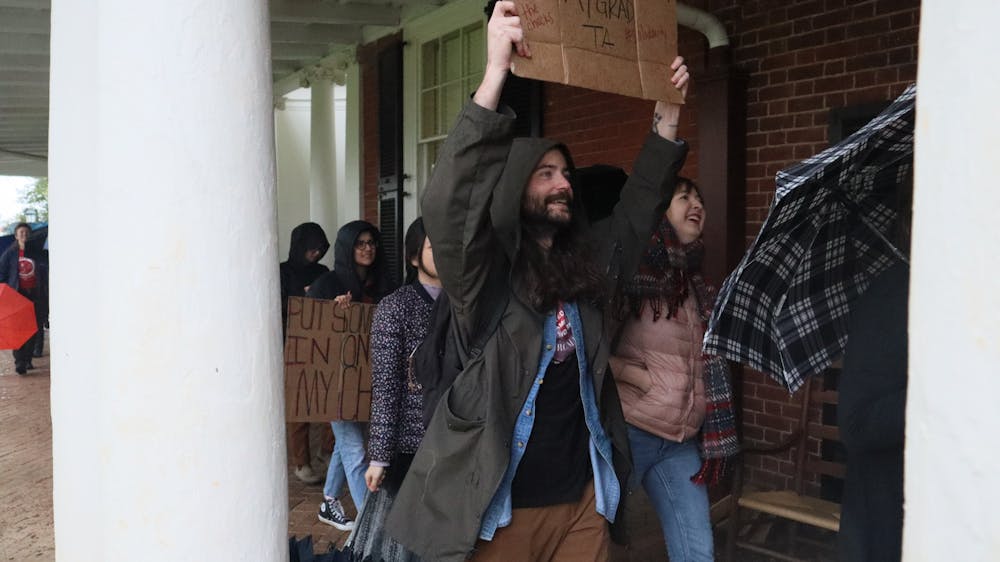Senior University administrators informed graduate students that the University will hire more staff in the College and Graduate School of Arts & Sciences in an effort to reduce errors in graduate stipend payments at a July 2 meeting. The development comes after over a year and a half of the “Cut the Checks” campaign, organized by the University chapter of the United Campus Workers of Virginia, a union representing employees at universities across the state.
The campaign, sparked by the issue of late and incomplete stipend disbursements, has consistently advocated for more resources being allocated to administrative staffing and pay, and a representative of the delegation that met with administrators — Graduate Arts & Sciences student Bethany McGlyn — said that they are pleased with the outcome, though she said that they believe that more work remains to be done.
Administrators in attendance told delegates about a number of recent and planned hires to address concerns around financial support and processing for graduate students. The UCWVA-U.Va. stated on X that there are nine to ten new hires, though University Spokesperson Bethanie Glover said the details and start dates of the hires is not confirmed.
“[The new hires] will be supplementing the administrative capacity of the departments within the College and Graduate School of Arts & Sciences, whose responsibilities include processing graduate student aid,” Glover said. “Additionally, the GSAS finance team added another full-time staff member earlier this year.”
Roughly 180 graduate students received their stipends late in December 2022, prompting the University chapter of the United Campus Workers of Virginia to send an open letter to University administrators demanding action on the issue. Since then, the “Cut the Checks” campaign has held a march on Grounds and a town hall meeting, where graduate students emphasized that late and incomplete stipends are a recurring problem, with some students having to adjust their budgets or pay rent late as a repercussion.
Executive Vice President and Provost Ian Baucom commissioned a task force to investigate stipend disbursement issues in January 2023, which delivered results in May 2024. Notably, the task force claimed that there were no systemic issues that might have caused the December 2022 payment problems, it instead laid the blame on bureaucratic delays and the miscommunication of deadlines. Some graduate students continued to argue that the overarching issue was systemic — citing resource allocation, including to administrative staffing, as the primary issue that has led to recurring payment issues. A number of graduate students sat in on the March 2024 Board of Visitors meeting, holding signs calling for more attention to the issue.
In response to protestors in attendance, University President Jim Ryan and Baucom committed to holding meetings with concerned graduate students to develop a solution. An initial meeting was held April 4, and graduate students in attendance said that while they were happy to have the chance to talk with high level administrators, the University did not commit to any new changes or initiatives.
After the July 2 meeting, McGlyn said that the graduate delegation was pleased that the administrators agreed with their concern over staffing levels. She said that some changes have already been made, including hiring an employee to assist Senior Financial Generalist Evan Barrow, who oversees many aspects of graduate student pay. According to McGlyn, many of the planned hires will work in supportive positions, acting as team leaders to assist departmental staff, who generally are the ones to directly manage stipend disbursements.
McGlyn said that while the “Cut the Checks” campaign is thrilled that the University is making new hires and increasing staffing levels, it will also have to increase staff pay to retain administrative workers and reduce turnover.
“If staff members can’t afford to live in Charlottesville then having [more supportive positions] is great,” McGlyn said. “But it won’t solve the problem that these positions aren’t filled with full time workers who have institutional knowledge and can make these departments and ensure that people are being paid what they’re owed on time every month.”
Another concern McGlyn mentioned as remaining unresolved is that administrators still have no systemic way to see if stipends fail to be paid on time. At present, graduate students still have to report problems with payments either through an online form or by contacting departmental staff.
While the last year has seen significantly fewer issues — with the University noting a 99.7 percent accuracy on disbursements — McGlyn said that the University should develop a system to track outgoing payments, instead of relying on graduate students to report payment issues.
“Ideally it should not be up to the worker to ensure they’re paid on time,” McGlyn said. “We’re still hopeful with all these system changes, but that is definitely something that is still a question.”
McGlyn said that organizers of the “Cut the Checks” campaign will continue to meet and monitor the new developments in order to see if the new hires will lessen the workload of current administrative staff. She said she hopes that the new changes will create a more efficient process that reduces the risk of error in stipend payments.
“We will be watching and waiting to hear whether or not late payments continue,” McGlyn said. “That is our next step.”







